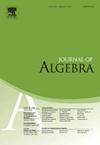单键生成半群中不可约多项式的比例
IF 0.8
2区 数学
Q2 MATHEMATICS
引用次数: 0
摘要
设p为素数,设S={xp+c1,…,xp+cr}是某c1,…,cr∈Z的单临界多项式的有限集。并且,假设S在q上至少包含一个不可约多项式,然后在S生成的半群内构造一个大的显式不可约多项式子集;事实上,当我们对多项式进行次数计数时,我们证明了这个子集在全半群内具有正的渐近密度。此外,当p=2时,我们构造了一个打破局部-全局不可约原则的无限半群族。为了做到这一点,我们使用了代数和算术技术和结果的混合,包括龙格的方法,椭圆曲线夏伯蒂方法和费马大定理。本文章由计算机程序翻译,如有差异,请以英文原文为准。
On the proportion of irreducible polynomials in unicritically generated semigroups
Let p be a prime number and let be a finite set of unicritical polynomials for some . Moreover, assume that S contains at least one irreducible polynomial over . Then we construct a large, explicit subset of irreducible polynomials within the semigroup generated by S under composition; in fact, we show that this subset has positive asymptotic density within the full semigroup when we count polynomials by degree. In addition, when we construct an infinite family of semigroups that break the local-global principle for irreducibility. To do this, we use a mix of algebraic and arithmetic techniques and results, including Runge's method, the elliptic curve Chabauty method, and Fermat's Last Theorem.
求助全文
通过发布文献求助,成功后即可免费获取论文全文。
去求助
来源期刊

Journal of Algebra
数学-数学
CiteScore
1.50
自引率
22.20%
发文量
414
审稿时长
2-4 weeks
期刊介绍:
The Journal of Algebra is a leading international journal and publishes papers that demonstrate high quality research results in algebra and related computational aspects. Only the very best and most interesting papers are to be considered for publication in the journal. With this in mind, it is important that the contribution offer a substantial result that will have a lasting effect upon the field. The journal also seeks work that presents innovative techniques that offer promising results for future research.
 求助内容:
求助内容: 应助结果提醒方式:
应助结果提醒方式:


